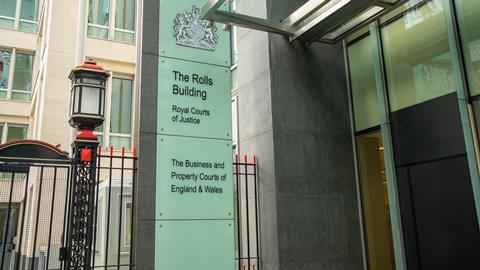A top London chambers has failed with a High Court bid to keep secret an alleged £2.75m fraud perpetrated against the set. While dealing with the consequences of publicity ‘may be an inconvenience, perhaps even a severe distraction’, it was not a good reason to depart from the open justice principle, the court ruled.
Pump Court Chambers was granted proprietary and freezing injunctions at an earlier hearing in respect of money it said had been wrongfully taken by its former credit control manager, Gillian Goodfield. The case was heard in private and the chambers was also granted an anonymity order.
Until June this year Goodfield had responsibility for the bank account in which fees due to barristers were paid and for ensuring funds were distributed. After she left her role £2.75 million was found to be missing from the account. Following the injunction and orders granted at an earlier hearing, Goodfield produced an affidavit ‘in which she candidly admitted to her wrongdoing; she had indeed taken the money and now bitterly regretted it’.
In an inter partes hearing before Charles Morrison, sitting as a deputy judge of the High Court, Pump Court Chambers (PCC) argued for the case to be heard in private.
The chambers argued that ‘allowing the matter to become public… put at risk the integrity of the chambers as a going concern’. Concerns included that ‘high-earning barristers’ might leave or that former members might make claims for unpaid sums. The chambers claimed ‘a spiral of decline could thus be the result of members of the chambers arriving at the view that they should not be last to leave’ and ‘firms of solicitors might use the circumstances surrounding the wrongdoing as a reason to delay making payment upon sums properly due and owing to PCC’.
The judge said: ‘It does not seem to me that the outcome feared by PCC is such as would stand in the way of the proper administration of justice or defeat the object of the hearing.’
He added that the hearing was to determine if the chambers was entitled to injunctions and disclosure orders which would not be prejudiced ‘by the court doing its business, as it usually does, in public’.
The judgment in Pump Court Chambers Ltd v Gillian Brown (also known as Gillian Goodfield) acknowledges that all members of the chambers are ‘now aware’ of the extent of Goodfield’s wrongdoing. It added: ‘Former members of the chambers, and indeed solicitors’ firms having dealings with PCC, might want to know of the problem at the earliest opportunity. In my judgment it is not for the court to regulate such affairs without a proper case for doing so being put before it. I don’t see that it was in the context of the question of whether or not the court would sit in private.’
The judge said in light of Goodfield’s admissions, non-disclosure of the party names was not necessary.
Refusing the application for the matter to be held in private and declining to make an anonymity order, the judge said: ‘On balance, I do not, in the circumstances of this case, see that the risk to the freezing and disclosure exercise makes it necessary for the matter to be heard in private so as to secure the proper administration of justice, or to avoid defeating the purpose of the hearing.’
In a statement on its website, Pump Court Chambers said: ‘Pump Court Chambers has discovered it has been the victim of a fraud by a former member of staff. This fraud took place some time ago and did not impact upon the operational running of chambers.
‘Upon discovery we took immediate and decisive recovery action. We are pursuing all legal avenues vigorously. Chambers takes theft and fraud extremely seriously and has put in place new systems to address any future risks.
‘Please rest assured that it is business as usual for our barristers and dedicated and trustworthy clerks, who remain fully committed to providing the highest standard of service to our clients. We appreciate your continued support during this time. As the matter is now in the hands of the police, we are unable to comment further at this time.’
Saaman Pourghadiri, instructed by Cooke, Young and Keidan LLP, appeared for Pump Court Chambers Ltd. Gillian Brown (aka Goodfield) appeared in person and was not represented.



























